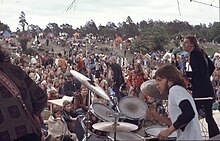Progg was a left-wing and anti-commercial musical movement in Sweden that began in the late 1960s and became more widespread in the 1970s. Not to be confused with the English expressions "progressive music" or "prog rock," progg is a contraction of the Swedish word for musical progressivism, progressiv musik. While there were progg bands playing progressive rock, the progg movement encompassed many different musical genres.
The political progg movement culminated around the 1975 Eurovision Song Contest, which was held in Stockholm after ABBAs victory in Brighton the year before. It was expressed that "music can't be a contest" and an "alternative festival" was held in protest.[1][2] Due to this debate, Sweden did not participate in the 1976 Eurovision Song Contest.
The progg movement was closely connected to similar movements in arts, theatre and design, as well as alternative lifestyles and left wing views. While being a political movement, some bands labelled as progg were nonetheless unaligned with any political agenda. The people playing and listening to this music came to be called proggare (literally "proggers") in Swedish.
